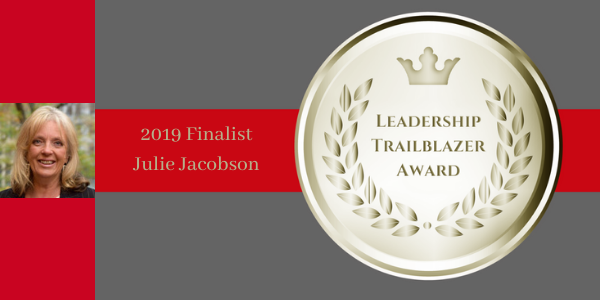MEET THE 2019 LEADERSHIP TRAILBLAZER TOP 10 FINALISTS

Today’s Trailblazer: Julie Jacobson, Town Manager, Auburn, MA
The League caught up with Top 10 Finalist Julie Jacobson to talk about being named a Leadership Trailblazer and having a career in public service:
Q: Congratulations on being named a finalist for the Leadership Trailblazer Award. What does it mean to you to be nominated?
JULIE: I am honored and humbled to have been nominated by my peers and to be selected by the panel of judges as a finalist. It is both exciting and awe-inspiring to be selected as a finalist and to be included among this distinguished group of women from across the country who have made such positive impacts on their communities and inspired other women in the local government profession.
Q: What led you to a career in public service?
JULIE: When I was in high school, I was intrigued by government so I volunteered to work on a local state representative’s election campaign. I was fascinated by the government process and the ability to impact the local community through the election of a candidate to the State Legislature. I went on to study history and political science in college. Following graduation from college, I began my career in government by taking a position in the Statehouse in Boston as a legislative aide for the State Representative whom I had campaigned for in high school. After 3 years in the Statehouse, I took a position in the City of Worcester where I remained for 16 years in various economic development positions, starting as a staff assistant and working up to the Economic Development Director position. After three years at the Worcester Regional Chamber of Commerce (first as Economic Development Director then as Interim President and CEO), I was offered and accepted the position of Assistant City Manager in Worcester where I served for over six years (and, simultaneously, as Chief Development Officer and Executive Director of the Worcester Redevelopment Authority). When the position of town manager opened in Auburn in 2010, I was ready to take on a new challenge and excited at the opportunity to become the CEO of a municipality. I have been the Auburn Town Manager since 2011 and I can truly say that I am as enthusiastic now as I was when I first began the position.
Q: Who were your mentor(s) or advocate(s) in your career?
JULIE: The State Representative for whom I volunteered in high school and then worked for as a legislative aide after graduating from college was a great role model. I was enthralled by the Statehouse, the legislative process, and the impact legislators could have on their local communities. It was such an exciting foray into government. The State Representative was a tremendous role model. He enjoyed the policy making, the legislative process, and making a positive impact on the constituents in his district. Ironically, decades later when I was the Assistant City Manager, this former state legislator was elected to the Worcester City Council so I had the chance to work with him again. Another mentor was my college professor and advisor at the College of the Holy Cross. He was a history professor and also a Worcester City Councilor who had also been mayor of the City. He really got me interested in history, the political process, and the various aspects of government and how local government impacts the lives of those in the community. Both of these mentors shared similar qualities: thoughtful, composed, good listeners and, perhaps most importantly, humble. They never boasted of their accomplishments and they treated everyone with whom they interacted with respect. They simply wanted to give back to their community and make a difference in the lives of the residents, and provide their employees and students with the skills to succeed. They were both excellent orators, a skill and quality I admired and sought to emulate. There were very few women in leadership positions in local government when I began my career. These two men had a great influence on my career choices and always encouraged me to seek positions in an industry that was dominated by men at that time. I strive to be as humble, objective, respectful and effective as they were in their positions.
Q: What is the most important lesson you learned while coming up in your career?
JULIE: It is critical to be a good listener and a strong communicator. Effective communications – both internal and external – is the key to engaging stakeholders in the community to work towards common goals as well as an important strategy to building and sustaining a strong management team. Local government leaders have to develop an effective, multi-tiered strategy to communicate with the residents, businesses, elected officials and the community at-large in order to build trust, ensure transparency, and engage stakeholders in the local government process.
Q: What advice do you have for women just beginning their careers who would like to be an executive in local government some day?
JULIE: I firmly believe that to succeed in local government, you have to have a passion for the profession. It is not just a job – it is a vocation, a calling. It is rewarding to realize the impact that your efforts have the residents and the community. I advise women seeking management positions in local government to get involved in organizations and informal groups to network, share ideas, and develop a support group. Establish a vision and goals that you want to accomplish as this will help keep you motivated and keep you on course. I can truly say that I am as motivated and enthusiastic today as I was when I first became town manager. I am always looking ahead to the next phase, the next project, the next undertaking even while working on current initiatives. It is also helpful as a leader to keep a sense of humor and stay positive. This not only motivates you but motivates your employees as well and sets a good tone for the workplace. I also encourage women to make every effort to balance your work-family life in order to fulfill your professional responsibilities while spending quality time with your family. Each person and situation is unique but it is important to find your individual balance so that you can fulfill your professional responsibilities while feeling fulfilled in your personal life. There is no formula – just strive for that balance that makes you comfortable and happy. It is also important to recognize that when there is a difficult situation at work, you need to put it in perspective. You need to recognize that most problems or issues can be resolved. Work with your team, reach out to other managers in the profession, look at best practices. There are many resources available to assist and guide managers. Don’t let tough situations derail you – this is a great profession.
Q: What do you hope to leave as your legacy in local government when your career comes to an end?

